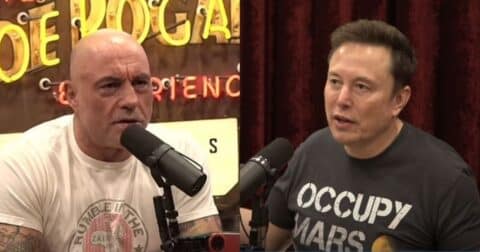News
GLP-1 Users Lose Weight, and Their Taste for Meat
Research•3 min read
Fact Check
In a recent podcast appearance, Musk spread climate misinformation.


Words by Gabriella Sotelo
Elon Musk recently appeared on The Joe Rogan Experience, where he discussed everything from the benefits of sleep to gaming. But the conversation quickly shifted to meat, and led to a brief exchange — based on misinformation, rather than facts — that beef does not have a climate impact. Given the show’s huge reach and Musk’s newfound political influence, the exchange is worth unpacking and fact-checking.
Musk, who was once considered environmentally forward due to his work with electric vehicles, has a notably different stance when it comes to the climate implications of beef. In fact, Musk has tweeted that farming has no impact on climate change, and that killing “some cows” won’t make a difference for the environment.
In reality, meat production and consumption are responsible for between 12 and just under 20 percent of greenhouse gas emissions. It is also a constant drain on our planet’s water and land reserves.
Musk’s suggestion otherwise reflects his ongoing dismissal of the environmental concerns surrounding animal agriculture. This is particularly concerning given his close relationship with President-elect Donald Trump, who recently appointed Musk to co-lead the new Department of Government Efficiency. Musk and Trump have had public discussions about climate change, with Musk once again downplaying the urgency of global warming by stating, “we don’t need to rush” when it comes to addressing the climate crisis.
“The constant barrage of misinformation — spread through ads, inaccurate alternative news programming, and uninformed podcasters and social media influencers — can create an illusory truth effect where repetition makes false claims seem credible,” Michelle Amazeen, a professor of mass communication at Boston University, and part of the university’s Climate Disinformation Initiative, told Sentient in an email.
Musk’s comments on the podcast, though brief, sidestep the growing body of evidence of the significant role the livestock industry plays when it comes to climate change. Let’s dissect their exchange, and take a closer look at how two extremely influential men are representing this issue.
Setting the scene, the conversation on animal agriculture started off with a one-off comment from Rogan about the carnivore diet, and how people dismiss it because of “propaganda” against animal agriculture.
Rogan: There is a lot of propaganda that put this thing out there that animal agriculture is the number one contributor to global warming.
Musk: It’s rubbish, it’s bullshit, it doesn’t matter.
Rogan: Not only is it hot bullshit, but the real problem is factory farming. Regenerative farming is carbon neutral.
Rogan is technically correct that animal agriculture is not the number one contributor to greenhouse gas emissions. In the United States, the EPA puts the transportation sector as the higher contributor, responsible for 28 percent of greenhouse gas emissions.
Factory farming is also an important facet of the issue, as Rogan points out. Since 99 percent of the meat we eat comes from factory farms, impacts from animal agriculture are, by default, attributable to factory farming.
Here’s where things go awry: despite Rogan’s claim, research shows regenerative farming does not make meat carbon neutral. While it does appear to have some soil health benefits, according to the research, getting carbon to stay put in agricultural soils has not panned out (again, by the research). Factory farming, which operates on a more efficient scale, actually tends to result in lower emissions per unit of meat produced, though the tradeoff is that living conditions tend to be worse for animal welfare.
Beyond direct climate pollution, factory farming is responsible for a range of other environmental problems and public health risks. Industrial animal agriculture is a leading cause of water contamination, as runoff from animal waste often ends up in rivers and groundwater, polluting drinking water supplies.
Factory farming is also a key driver of antibiotic resistance, which contributes to the rise of drug-resistant pathogens that threaten human health. These farms are often linked to disease outbreaks, including avian flu, as overcrowded conditions make it easier for diseases to spread from animal to animal and, in some cases, to humans.
All that said, research has shown that changing the way we produce meat to a more land-intensive approach like organic or regenerative (what some call “better meat”) would be worse for climate change, not better, even if it might result in some important improvements, to soil health and animal welfare, for example. No matter the method, there is no getting around the urgent need for people in the Global North to reduce their meat consumption in order to stave off the worst global warming scenarios.
The exchange went on:
Musk: The animals aren’t going to make any difference to global warming. Zero percent, nothing…
It’s not gonna make any difference to global warming or the CO2 concentration atmosphere, really, if people eat pure steaks, it doesn’t matter. It’s irrelevant. Irrelevant. I wanted to be super clear about that. Yeah, it will not matter. You will not even be able to measure it. Okay, that’s how irrelevant it is.
This statement is patently incorrect.
As already stated, livestock farming contributes between 12 and 19.6 percent of global greenhouse gas emissions, according to a range of studies. These figures come from peer-reviewed research conducted by experts in the field, such as the United Nations’ Food and Agriculture Organization (FAO), which uses comprehensive methods to estimate emissions from different sources in the agriculture sector, including enteric fermentation (methane from digestion) and manure management. The lower estimate — 12 percent — comes from an FAO report, but more recent studies by the FAO and its partners suggest livestock emissions could be higher, depending on research methods.
Musk’s claim that the impact of meat consumption is “irrelevant” fails to account for these significant potential reductions in emissions. Even reducing global meat consumption a few days a week would result in substantial environmental benefits.
While plant-based meat can help facilitate this transition, the plant-based protein industry is another point of contention for figures like Musk and Rogan — which leads to another part of their exchange that was also incorrect.
Rogan: Do you think that is just propaganda because of people that have a vested interest in things like plant-based meat products and things along those lines? Green energy.
Musk: I think that’s part of it. You know that you’re only going to get people pushing to avoid meat, like some people, just maybe they go natural, just maybe they just like vegetarians or vegans or whatever ideological, ideological reasons.
In reality, the meat industry remains much bigger, and far more influential than any so-called plant-based propaganda. Plant-based meat sales have gone down in recent years, in part thanks to the meat industry campaigning against plant-based alternatives, labeling them as “ultra-processed.” These efforts are designed to steer consumers back to traditional meat.
The meat industry has actively worked to shape public policy and perception through government programs, such as the beef and pork “checkoff” programs. These are initiatives funded by the meat industry to promote the consumption of beef and pork. One of the most famous examples is the “Beef. It’s What’s for Dinner.” campaign, which has been running since 1992. These programs have been highly effective in bolstering the demand for meat, creating an environment where meat consumption is not just normal, but celebrated.
While the plant-based industry is still growing, it simply does not have the same resources to flood the media with messages aimed at shaping consumer behavior and policy in the same way the meat industry has, and currently does.
Here is how the conversation on this topic ended between Musk and Rogan:
Rogan: Isn’t it funny that is heretic speaking now. That’s crazy talk now, nowadays it’s like you have to say that we have to eat less meat. That meat is bad.
Musk: Totally eat as much meat as you want, it is not going to make a difference. And if somebody says it does make a difference, I’m like, how will you measure it? And if you can’t even measure it, then it’s bullshit.
In fact, there are many ways to measure emissions from meat production. The University of Wisconsin-Madison has outlined several methods, including the use of respiration chambers, which capture the gasses animals release during breathing, and the SF6 technique, a more advanced method where a tracer gas is used to measure methane emissions directly from livestock.
Another key tool in the field is the Global Livestock Environmental Assessment Model (GLEAM). GLEAM is designed to analyze environmental factors like feed use, land use, greenhouse gas emissions and more. GLEAM’s goal is to measure resources used during livestock production and then identify the environmental impacts of farming livestock, arriving at the 12 percent figure cited above.
Scientists Joseph Poore and Thomas Nemeck also took a deep dive into global food systems by analyzing 570 studies across 38,700 farms in 119 countries in 2018. They focused on five key environmental factors: land use, water use (factoring in local water scarcity), greenhouse gas emissions, acidification and eutrophication emissions. Their findings showed that food systems are responsible for about 26 percent of global emissions (a more recent study put the number at around a third), with meat production as the largest driver of food-related emissions, responsible for 57 percent of that sector’s pollution.
These models are key to understanding the full scope of livestock’s impact on the planet, something Musk and Rogan’s dismissal of the issue fails to acknowledge.
The impact of the views expressed by Musk and Rogan are not insignificant — The Joe Rogan Experience attracts millions of listeners, and the episode in question alone has been watched over 16 million times on YouTube and viewed by over 51 million on X. It also represents the way misinformation can easily spread on the internet.
“Podcasts are also becoming an increasingly popular medium for news, with nearly half of U.S. adults having listened to at least one in the past month, according to Statista. Both presidential candidates tapped into this trend, appearing on influential podcasts such as Joe Rogan’s and Howard Stern’s,” Amazeen writes to Sentient. “These alternative news sources often lack the commitment to journalistic principles like verification and accuracy.”
Musk has also centered himself in the public discourse, now tapped for Trump’s incoming administration. Given Trump’s previous track record of downplaying climate issues, there is a strong possibility that Musk’s views will reinforce the President-elect’s views, and his continued support of the meat industry.